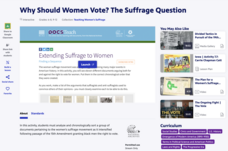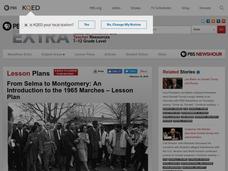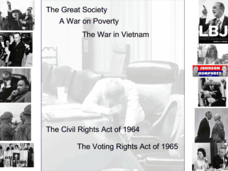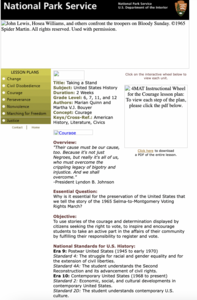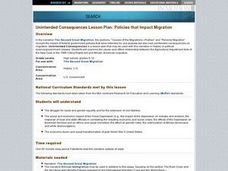PBS
Why Should Women Vote? The Suffrage Question
An online interactive activity asks learners to analyze a group of documents related to the women's suffrage movement and then place the documents on a timeline. The results assess users understanding of the progression of the women's...
Teaching Tolerance
Using Photographs to Teach Social Justice | Legal Action: The Supreme Court
A social justice lesson focuses on the Supreme Court case Loving v. Virginia which struck down laws that prohibited marriages between African Americans and white Americans. The lesson begins with class members examining a photograph of...
National Woman's History Museum
Susan B. Anthony: She's Worth a Mint!
A instructional activity all about Susan B. Anthony showcases the Civil Rights leader's contributions towards equality. A Susan B. Anthony coin sparks engagement. Scholars take part in a discussion that sheds light on what being an agent...
Soft Schools
Civil Rights
Informational text about the Civil Rights Movement challenges young historians to prove their reading comprehension skills with six multiple choice questions. After answers are submitted a new screen displays a score, answers—correct and...
Teaching for Change
A Documents-Based Lesson on the Voting Rights Act
How did the Voting Rights Act affect the daily lives of American citizens? A document-based lesson developed by the Student Non-Violent Coordinating committee (SNCC) presents a case study of the impact of the Voting Rights Act of 1965 on...
Carolina K-12
Making First Vote Your Vote: Designing a Schoolwide Election
Encourage pupils to design an election plan for the entire school. They participate in a Board of Elections, create polling rules, discuss election controversies, write questions about the issues, run the election through an online...
PBS
From Selma to Montgomery: An Introduction to the 1965 Marches
The 1965 Civil Rights marches from Selma to Montgomery and the resulting Voting Rights Act of 1965 are the focus of a social studies lesson. The resource uses film clips to inform viewers not only about the discrimination that gave rise...
Close Up Foundation
Teach the Vote
Why is voting important? A social studies unit presents a non-partisan approach to the importance of voting, to voting laws and procedures, and to resources that voters need to become informed voters.
Anti-Defamation League
Martin Luther King, Jr. and Civil Rights
How far have we come and how far do we still need to go to achieve equality and full civil rights in the United States? Include a packet of materials collected in your observance of Martin Luther King, Jr. Day.
Student Handouts
Voting Rights Speech Before Congress
Is your class studying civil rights? Consider taking a look at President Lyndon B. Johnson's voting rights speech. This resource includes an abridged version and three related questions. Pupils consider Johnson's use of language and the...
Curated OER
President LBJ
Here's a quick look at the Johnson presidency. Each of his major acts are discussed with images and video web links. The Voting Rights Act, Tet Offensive, Civil Rights Act, and War on Poverty are defined.
NYC Department of Records
Citizenship and Elections: The Importance of a Ballot
Approximately 58 prcent of those eligible voted in the 2016 US Presidential election. In an attempt to impress upon learners the importance of voting and voting rights, class members examine primary source documents related to the...
Curated OER
Race and Representation
Young scholars consider race and representation. In this voting rights lesson, students listen to their instructor lecture on the Voting Rights Act of 1965, Georgia congressional districts, and North Carolina voting districts. Young...
Curated OER
Suffrage and Civil Rights
Addressing the main ideas of the Civil Rights movement, this instructional activity contains both multiple choice and true/false questions for student review. Teachers could use this activity as a quiz or homework assignment.
Curated OER
Why Can't I Vote?
Fourth graders take an unannounced test (failure is expected) and the top scores are rewarded with candy bars. They compare this test to the literacy tests given before 1960 and votes to candybars. They journal their responses.
Curated OER
Voting Then and Now
Students consider the impact of the Voting Rights Act as they examine voting practices today. In this voting lesson, students research details regarding the Voting Rights Act and then read a handout regarding voting data from the early...
Curated OER
Taking a Stand - 1965 Selma-to-Montgomery Voting Rights March
Young scholars examine the 1965 Selma-to-Montgomery Voting Rights March. They view pictures reflecting their perceptions of their most important rights as citizens, write journal responses, create collages illustrating courage, and read...
Curated OER
Unintended Consequences: Policies that Impact Migration
Students examine the cause-and-effect relationship between the Agricultural Adjustment Acts of the New Deal or the 1965 Voting Rights Act and African-American migration. They write an essay evaluating the effectiveness of the Voting...
Other
The Center for Voting & Democracy: The Voting Rights Act
The Center for Voting and Democracy offers a general overview of the Voting Rights Act of 1965. Content focuses on Section 2 and Section 5 of the Act, exploring their importance.


